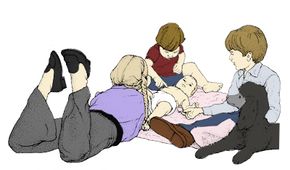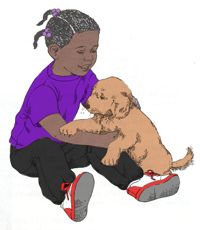Even if your young child has visited you and the baby in the hospital, the baby's homecoming may be a bit traumatic. What had been talked about and thought about as an event to come has become reality -- the future is here, and the baby is a real, live creature. Here is some helpful advice which can ease your family's adjustment to the new baby's presence.
Bringing the Baby Home
There are three schools of thought concerning the best way to bring your new baby into the house:
- Some parents feel a toddler or preschooler should be away from home, perhaps visiting Grandma, and should be brought back after mother and infant are well settled.
- Others think a young child should definitely be part of the reception committee. They advise the mother have someone other than herself carry the baby into the house and she devote herself to the older child exclusively for a short time after coming home.
- Still others say the child should accompany the father to the hospital to pick up mother and infant. You should choose the method you feel is right for your family.
Is it wise to come home bearing gifts for your older child? Some parents like to give the older child one large present to celebrate the birth of the new brother or sister, choosing one that emphasizes his or her maturity, such as a new game or some more sophisticated art materials. You may also want to have a supply of small gifts to hand out when visitors bring presents to the baby only. It's best not to overdo the gifts, though, either before or after the baby arrives. Even toddlers recognize bribery when they see it, and the message you send is an apology for bringing home an interloper.
Helping Siblings Adjust to the Baby
Your children will react to the actual presence of the baby in different ways, depending upon their ages and personalities. However well prepared they are, they will at first almost surely be surprised and most likely disappointed. The baby is neither the playmate your toddler or preschooler secretly expected, in spite of your warnings to the contrary, nor the smiling, gurgling, picture-perfect infant your older child probably visualized. Even the baby's sex may be disappointing, and the fact he does nothing but eat, sleep, and cry -- and monopolize your attention -- surely will be.
Your main enemy at home will be time, especially if you have a toddler or preschooler; you will never have enough of it. Many parents feel guilty of neglecting the older child because the infant takes so much time. Psychologists tell us underlying that guilt is anger at being torn between the two children. One way to help yourself feel better and to make your older child feel wanted is to include him or her in every possible part of the care of the baby. Even a two year old can fetch a diaper from upstairs, perch on a stool beside you at the dressing table, or help you pat the baby dry after a bath. Little kids can sort the baby's laundry, help you gently pat up a burp after a feeding, and entertain the baby with nursery songs and finger plays.
Let your child hold the baby on a pillow, in a big chair, when you are nearby. If you bottle-feed, let her hold the bottle for a few minutes, and demonstrate the way to gently pat the baby's cheek to see the baby's head turn. Warn the child about the anterior fontanel (the soft, boneless spot at the top of the head), but don't be unduly alarmed if she touches it; it's protected by a firm membrane. Do be sure to supervise very carefully any help or playing with the baby. Be sure your child understands she must never try to pick up or carry the baby. Avoid any possibility of harm to either child by putting the baby in the crib or in an infant seat inside the playpen if you have to leave the room.
Feeding time may be difficult, especially if you are nursing the baby -- a time when your toddler or preschooler feels left out and is apt to show displeasure with you by getting into trouble. The feedings that come when your older child is napping or has gone to bed for the night, or when someone else is in the house to provide distraction, are the ones during which you can devote your attention entirely to the baby, providing the important eye contact. When your older child is present during feedings, settle yourselves on the sofa and cuddle him or her with your free arm as you read or watch television together. Or sit comfortably on the floor, with your back braced against a piece of furniture, and watch or help while the child works with puzzles, games, or coloring projects. The baby won't suffer; your touch and the sound of your voice are soothing.
What if your older child wants to try nursing again? It won't hurt, if you are agreeable to the idea. Chances are one quick try will be enough. The child won't like the taste of your milk and probably won't be able to suck properly.
Wanting to go back to nursing is only one of several signs of regression you might expect, and they won't necessarily show up immediately after the baby arrives. A return to baby habits concerning toilet training, eating, sleeping, talking, or dressing may be more a sign of stress than of jealousy. Whatever the cause, your child is trying to get your attention by competing with the baby on the baby's own level. The best way to handle regressive behavior is to go along with it patiently and without showing anger or disappointment; it will pass. Be generous with praise for any mature behavior, and reward it with grown-up privileges, such as staying up a bit later than usual or going on an important errand with Daddy.
Dealing With Sibling Rivalry
Real jealousy will almost surely rear its ugly head sooner or later among children younger than school-age. Busy and independent older ones will probably take the new arrival in stride, suffering little, if at all, from feelings of rejection. Very likely they will be proud to have a baby in the family. They will look upon the infant as a sort of live plaything to be loved and cuddled and shown off to their friends. The best ways to help the little ones through their feelings of displacement and rejection are to show them your love in every way you can and to spend as much time alone with them as you possibly can.
Your toddler is too unsophisticated to be anything but up-front about his or her feelings; life with the interloper who makes so much noise and takes all Mommy's time is unbearable. He is likely to ask you to take the baby back and be frankly envious of the attention the baby gets. You may be able to cheer up the child a little when you stress how lucky the baby is to have such a fine big brother and let him help you care for and entertain the baby. This child isn't old enough yet to have developed much feeling about right and wrong, and pinching, hitting, or sitting on the baby won't seem a crime to him. You need to watch the child closely and lay down a no-nonsense law that the baby must not be hurt. This may be one of the rare times you choose to use strong discipline.
By the age of three, your child understands that deliberately hurting the baby is wrong. Do, however, watch the pats and squeezes and hugs; they may be a bit too hard. This child may be so angry about the baby's appearance that he won't talk to you, won't cooperate in any way. Or he may be afraid to displease you by showing the anger. Your toddler may be excessively well behaved or fake exaggerated and unfelt love for the baby. You can admit to this child that, yes, the baby can be a nuisance, bothering you when you two are reading or playing. Be careful not to give the idea that there's any solution other than the baby's ultimate growing up into a reasonable child.
Your preschooler will probably try to take your attention away from the baby by showing off his or her feats of strength and skill and cleverness. The child feels rejected and cannot understand what you see in this infant who can't do anything interesting or worthwhile. A little girl may be particularly jealous of Mommy, a boy of Daddy, and each may try to take over the other parent. Such feelings of jealousy and resentment are strong, and you will do well to acknowledge them and encourage the child to talk about them.
You probably expected that it would take some time for your other children to adjust to the baby, and jealousy is a typical reaction for younger siblings. But you may not have anticipated the adjustments you'll have to make for grandparents and other adults. Keep reading for a discussion on life with your parents after your baby is born.
This information is solely for informational purposes. IT IS NOT INTENDED TO PROVIDE MEDICAL ADVICE. Neither the Editors of Consumer Guide (R), Publications International, Ltd., the author nor publisher take responsibility for any possible consequences from any treatment, procedure, exercise, dietary modification, action or application of medication which results from reading or following the information contained in this information. The publication of this information does not constitute the practice of medicine, and this information does not replace the advice of your physician or other health care provider. Before undertaking any course of treatment, the reader must seek the advice of their physician or other health care provider.


